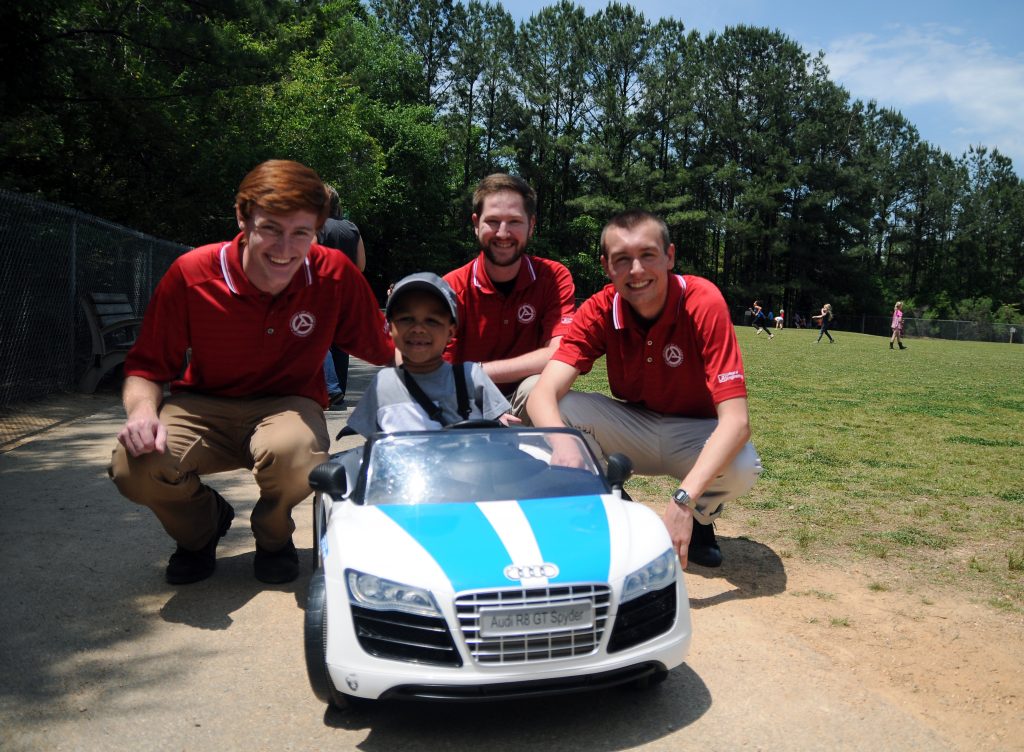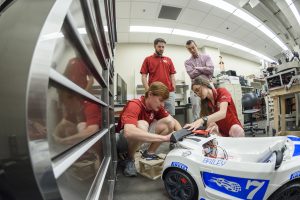Toy Car Adapted by Engineering Students for Child with Special Needs

With cheers of “Go, Bailey, go!” coming from a crowd of children, engineering students from UA gave a special needs child at Inverness Elementary School a car he can drive himself.
The six students adapted a toy ride-on car for Bailey Harris, a kindergarten student at the Shelby County school who was born with physical challenges. The car, which Bailey can control with his feet, allows him to move around at recess with classmates.
“It has been a great learning experience, but more that than, it just has been a good project,” said Christopher Augustine, who just graduated in electrical and computer engineering and is from Columbia, South Carolina.
The project began when Debbie Slawinski, Bailey’s teacher, contacted UA’s College of Engineering with the challenge of designing a vehicle for Bailey to drive on the playground.
Slawinski said she never imagined her initial email would have such a result: “It is just the perfect thing for Bailey.”
She was connected with Dr. Kenneth Ricks, associate professor of electrical and computer engineering who also advises robotics teams. One of those teams, Alabama Astrobotics, adapted a similar car a year ago for a student at the RISE Center at UA.
Ricks assembled a group of students, three from the Astrobotics team and three other electrical and computer engineering students. He formed a special topics course in engineering for the spring semester so students could get course credit for their time.

“There’s some cool engineering going on, so it’s worthy of a special topics class,” Ricks said.
Michael Outlaw, who is originally from Shelby County and graduated with an electrical engineering degree this month, said adapting the car in a short span was an exciting project.
“It’s been cool to actually see what we learn applied in real life to an actual project instead of just working in a lab on a small portion of it,” Outlaw said.
From Toy to Custom Car
The students took the toy car off the shelf and began work. For starters, they took it from a one-wheel drive to powering two wheels. They also replaced the original battery with two larger batteries, roughly tripling the car’s power and increasing operation time, Outlaw said.
The biggest adaptation was disconnecting the steering wheel so that Bailey could drive with his feet. The students met with Bailey about four times during the project to find out the best method for him to steer and power the car.
“We had to create something that is accessible to him and also comfortable to him so that he’ll want to use it,” said team member Rebecca Dietz, who graduated in mechanical engineering this month.
They settled on an analog joystick that he can control with his left foot to steer the car and power it. A big button he can press with his right foot toggles the car between forward and reverse.
Remote controls enable Bailey’s teachers and family to control the car if needed, and a kill switch at the back will stop the car in case of emergency.
Bailey’s face lit up as he learned to drive the car around the field outside his school as his classmates cheered him on. That smile was the reason the team took on the project, Augustine said.
“It was a lot of hard work, and it made all of the hard work worth it, definitely,” he said.
Other engineering students on the team include Spencer Davis from Madison, Mississippi; Max Eastepp from New Orleans, Louisiana; and Nicholas Rodriguez from Atlanta, Georgia.
